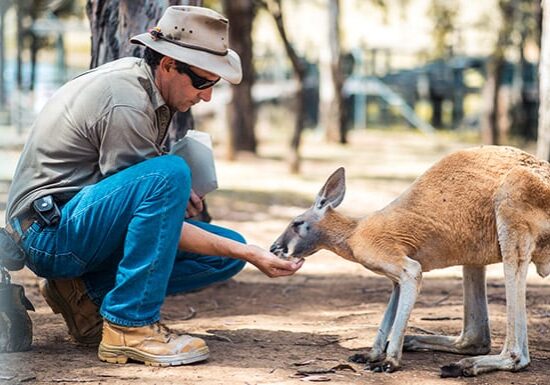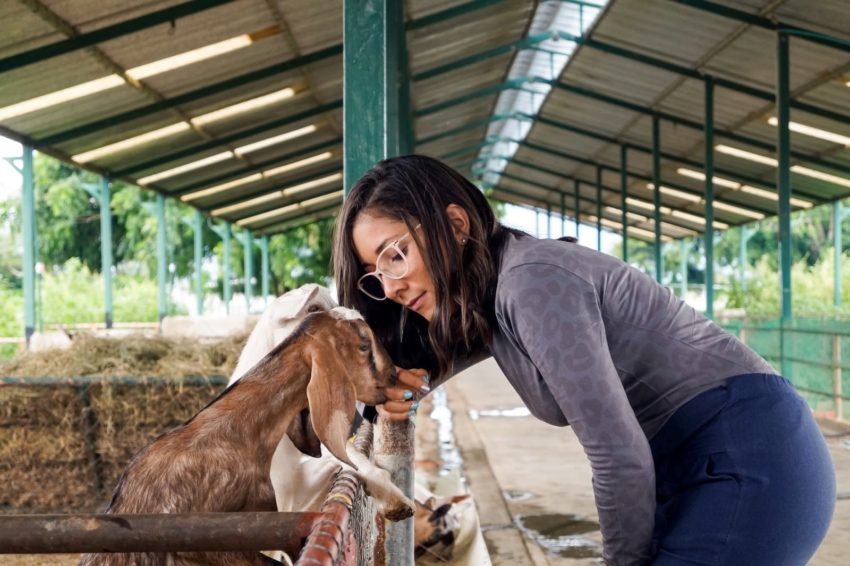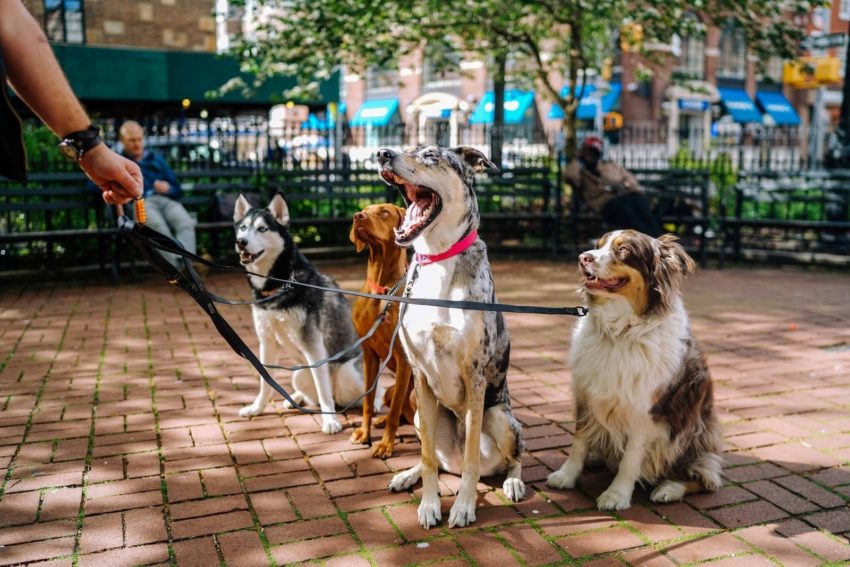10 Best Jobs Working With Animals
Updated: June 19, 2024
Published: August 7, 2021

If you love animals, then you’ll probably love making a career working with them. Most people think that one of the only ways to work with animals on a day-to-day basis is to become a veterinarian. While that is a great career choice, you can find plenty of other jobs working with animals.
Whether you want to go to school to work more closely with animals in a medical or research capacity, or you simply want to care for them in other ways, there are a few career paths you should consider.
Here we’ll outline some of the jobs working with animals that require a formal degree, and others that don’t require any schooling or perhaps just a certificate. Keep reading and maybe you’ll find your dream job working with animals!

Education Requirements to Work With Animals
A love for animals and a passion for their welfare are the basic requirements for any job that works closely with animals, however, there are some other requirements for most jobs that you’ll need to meet.
If you’re interested in becoming a veterinarian, you should expect a few years of rigorous schooling before you’re able to practice. Depending on where you live, the number of years you’re in school can vary. However, you’re usually expected to earn a Doctorate of Veterinary Medicine in order to become a veterinarian. In addition to that, you’ll also need a valid license to practice, which means there are even more state or federal exams to pass even after you’ve graduated.
For other medical-related jobs working with animals, such as a vet technician, you’ll still need a degree or at least a certification in order to find a job. Zoologists also often need multiple degrees in order to practice, especially for specializing in a specific area of zoology.
During your undergraduate, graduate, or PhD degree, you can expect to study topics such as biology, chemistry, physiology, and anatomy. You’ll also likely need to conduct research, participate in internships, and prepare a thesis.
Of course, your education depends on your specific area of study and your specialty. While working with animals can be rewarding, you need to be prepared to put in the work in order to fulfill the educational requirements.
Jobs Working With Animals That Require a Degree
Here are some of the most popular jobs you can do that allow you to work with animals that require at least one degree.
Veterinarian
This is probably the first job that springs to mind when you think of working with animals, and for good reason. According to the 2019 National Pet Owners Survey, 67% of households own a pet in the US, so clearly there’s a need and a demand for vets across the country!
As a veterinarian, you’ll be responsible for the overall welfare of owned animals, whether it’s a family dog or a horse on a ranch. Vets diagnose illnesses, perform surgeries, prescribe medication, and a lot more.
Veterinary Technician
A veterinary technician works in a vet’s office, but doesn’t have the same duties as the veterinarian themselves. Therefore, you don’t need as much schooling for this job. Depending on the position, you’ll need on average two to fours years of education for this type of job, compared to at least six to become a vet. A veterinary technician is almost like a nurse, as they draw blood, help vets with procedures like surgeries, perform tests, and care for recovering animals.
Zoologist
In case the name didn’t give it away, zoologists work with animals in controlled settings like zoos and also animals in the wild. A zoologist is a relatively broad term, and most people working in this field have a concentrated specialty, such as working in conservation, animal behavior, or research. You can get a job as a zoologist with only a bachelor’s degree, but for work that involves certain specialties as well as research positions, you’ll need a master’s or a doctorate.
Animal Nutritionist
While you won’t work as closely with animals in this position as you would with other jobs on this list, it’s still an interesting field to pursue. Animal nutritionists are responsible for understanding the dietary needs of certain animals in order to assist in formulating foods for them. Animal nutritionists often work both directly with animals, studying their behavior and natural eating patterns, and then in labs to create nutritious and economically viable foods for animals.
Marine Biologist
Often regarded as a branch of zoology, marine biology deals with all the wildlife that lives in water. If you’re passionate about fish and marine animals, or you love scuba diving and spending time on boats, this can be the perfect job for you. Marine biologists can specialize in different areas, such as underwater conservation, global warming and its effect on marine life, or researching the migration of whales. It’s not all fun at sea though, as you’ll also have to conduct research, analyze data, and compile reports.
Jobs Working With Animals That Don’t Require a Degree
Maybe you don’t want to research animals, or you don’t have the stomach to perform surgery. Not to worry, there are other career paths for you that don’t involve years of studying! Here are a few jobs working with animals you can do without a degree or only a certification.

Animal Groomer
Everyone deserves a spa day, even our furry friends. Animal groomers are responsible for shampooing and drying animals, trimming and cutting fur, cutting nails, and cleaning teeth and ears. They’re also able to style your pet’s fur if they have a long coat.
Most groomers only require a high school diploma and the rest of the training is done on the job. Most groomers don’t need a certification, but depending on your state or if you’re a freelance groomer, you might need a grooming license.
Dog Walker
It seems like a simple job, but walking multiple dogs at once can be quite the challenge. If you’re unable to have a four-legged friend of your own, say your landlord doesn’t allow pets or your significant other is allergic, then dog walking can be a great avenue to both make some money and spend quality time with animals. Dog owners often hire dog walkers to take their beloved pets out when they’re away or at work. But it’s not all fun and games. You’re responsible for both the welfare of these dogs while they’re in your care and making sure they behave appropriately in public.
Pet Sitter
Pet sitting involves more than just a friend or family member asking you to take care of their cat while they’re on holiday. In fact, there are professional pet sitters who get paid to both take care of someone’s home and their pets while they’re out of town.
Websites like Rover help owners find reliable pet sitters in their area. If you’re interested in pet sitting, you can create an account on their website to start getting requests, or search local classified ads to find people searching for pet sitters.
Animal Care Attendant
Animal care attendants work in pet boarding centres, kennels, or animal shelters. Their job is to look out for the welfare of animals while they’re in these types of boarding facilities. This job’s tasks include feeding animals, cleaning their living quarters, administering medication, bathing, and walking animals, among other things.
Even though they might be caring for a large number of animals at the same time, it’s also their job to look out for any signs of illness or animal discontent and report it to a veterinarian. Normally, training for animal care attendants is provided on the job.
Trainer
Trainers work closely with animals in order to observe their behavior and teach them new tricks or to teach them obedience. Trainers often specialize in working with a specific type of animal.
For example, dog trainers might teach puppies basic tricks and obedient behaviors, while other trainers might work with animals like horses and teach them to work with riders and prepare them for events, races, or performances.
Depending on your specialty, you may or may not require a degree or a certification. For example, marine animal trainers usually require at least a bachelor’s degree in animal science, marine biology, or a related field.
To Wrap Up
There are many jobs working with animals aside from ones on this list, so in order to find the best one for you, it’s important to narrow down your choices. Do you want to study in order to have a career working with animals? Do you want to work with animals physically or in a research capacity? Do you want to work with domesticated or wild animals?
There are many questions to answer before embarking on your journey, so it’s necessary to narrow down your options before you get started.
If you’re interested in being a part of the business or technical side of working with animals, then consider studying a degree in something like business administration. University of the People offers online tuition-free studies, so you can earn a degree while still working with animals in your spare time.
